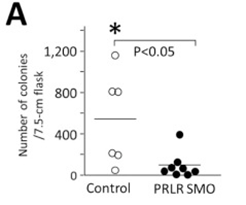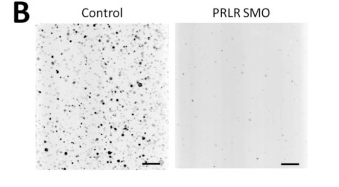Splice Modulating Oligonucleotides as a Breast Cancer Therapy
Patent Status
| Country | Type | Number | Dated | Case |
| United States Of America | Issued Patent | 9,909,128 | 03/06/2018 | 2012-794 |
Background
Breast cancer is the most widely-diagnosed cancer in women. Over 266,000 women in the US will be diagnosed with breast cancer this year. Approximately 95% of breast cancers express prolactin receptors compared to 70% of breast cancers that express estrogen receptors. It is desirable to develop a therapy to target a common receptor expressed in ~95% of breast cancers.
Brief Description
UCR researchers have designed novel splice modulating oligonucleotides (SMOs) that decrease expression of the long form of the prolactin receptor, thereby significantly inhibiting the metastatic spread of breast cancer to the lungs and liver. The SMO treatment also increased central death in the primary breast tumor. These SMOs may also target metastases produced by non-prolactin receptor-expressing primary tumors since all cancer stem cells examined so far are positive for the prolactin receptor. The researchers administered SMOs to two highly aggressive metastatic models of breast cancer, BT474 human xenografts, used for testing Herceptin, and a 4T1 syngeneic mouse model, which allows testing with an intact immune system.

Fig. A obtained from animal models treated with SMOs show a reduction in the number of metastatic colonies in the lung.

Fig. B titled "Control" is a stain of the metastatic colonies without SMO treatment. Fig. B titled "PRLR SMO" is a stain of the colonies after 40 days in vivo treatment with the UCR SMOs.
Applications
- May also be used to treat prostate and ovarian cancers since prolactin receptors are expressed in these cancers.
- New class of therapeutic drugs that may be used to target other metastatic cancers and other indications triggered by alternative splicing
Advantages
- Targets untreatable breast cancers - may be used to treat triple negative breast cancer since it expresses the prolactin receptor and there are no targeted therapies for this cancer.
- 75-95% reduction in the number, size and density of metastatic colonies
- 95% decrease in the number of cancer stem cells
- High Target Specificity - targets only one splice form of a receptor, signaling molecule, or transcription factor
- Non-Toxic - after up to 18 months of treatment, no signs of SMO toxicity in animals or in tissue samples obtained from animals treated with SMOs.
Related Materials
Contact
- Grace Yee
- grace.yee@ucr.edu
- tel: View Phone Number.
Other Information
Keywords
breast cancer, metastasis, cancer stem cells, splice modulating oligonucleotides, SMO, prolactin receptor, alternative splicing, splice isoform, therapeutic, kinase phosphorylation
